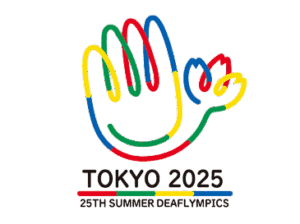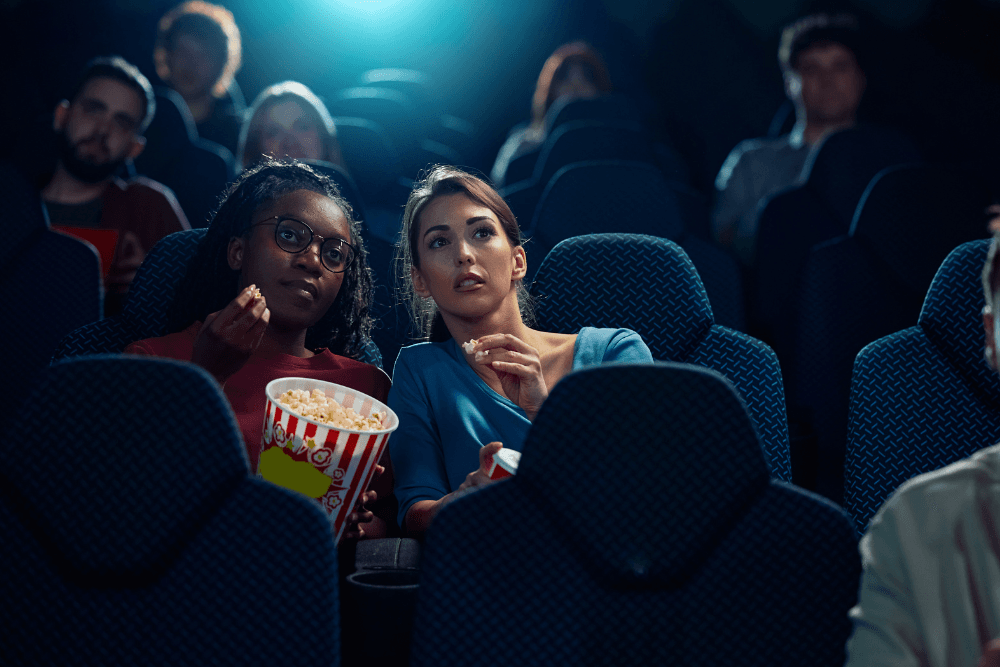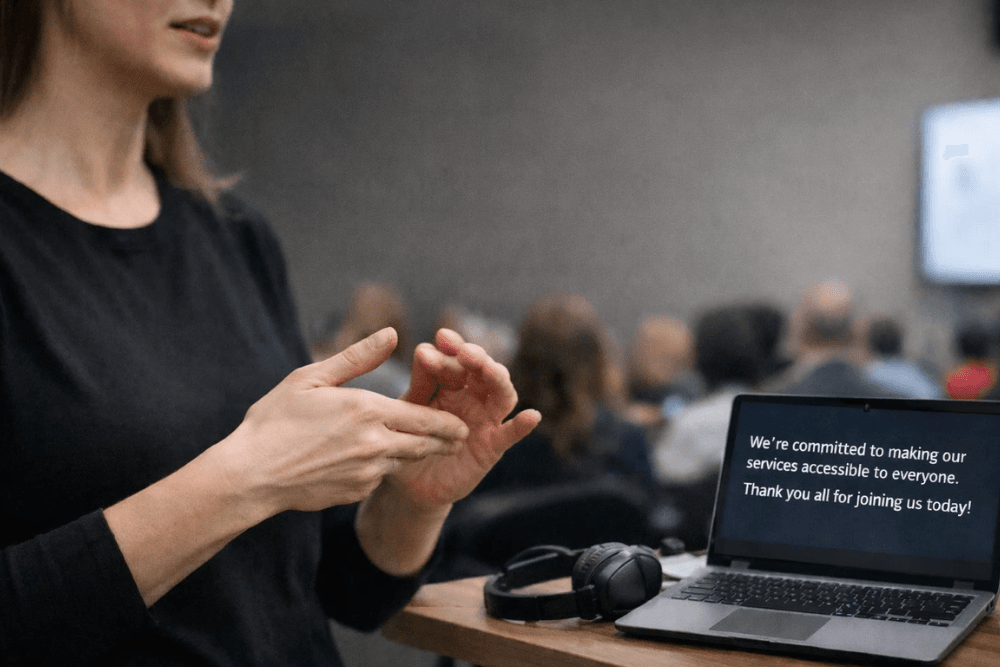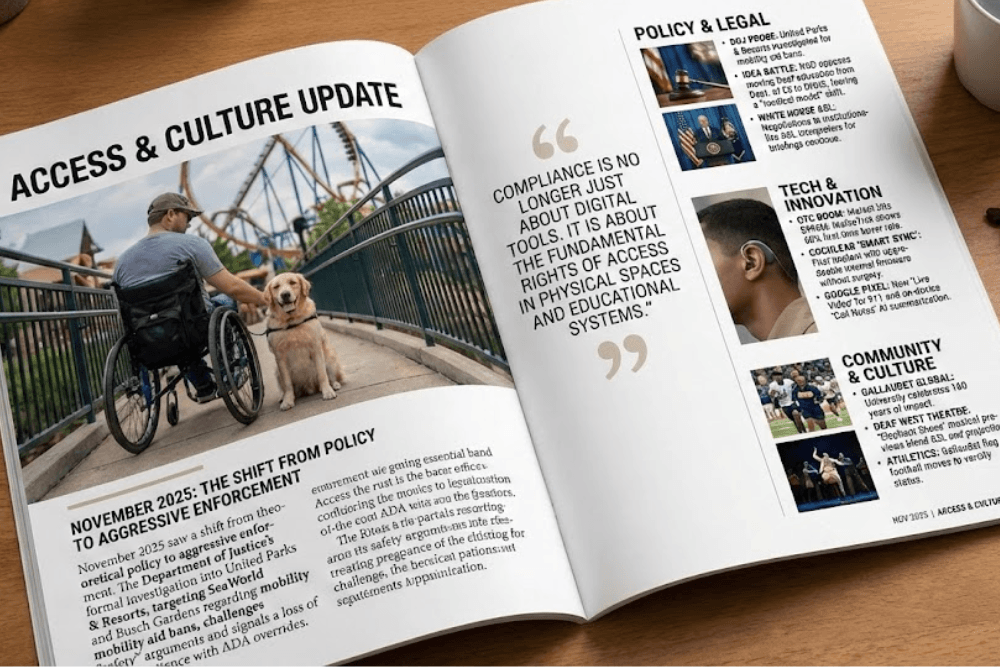Selected stories this week from the world of ASL, Deaf and Accessibility.
NIH Funds DeafBlind Language Study
Gallaudet University secured a five-year, $2.5 million grant from the National Institutes of Health to study Protactile language acquisition in DeafBlind children under age five.
Dr. Deanna Gagne leads the research alongside community co-investigator Hayley Broadway of Touch Seeds, marking a rare instance of DeafBlind-led research design. Protactile (a tactile communication system that emerged among DeafBlind adults over the past 15 years) differs structurally from ASL and spoken languages, yet few young children have access to fluent Protactile models. The NIH funding, drawn from the National Eye Institute and Office of Behavioral and Social Sciences Research, will connect families and early-education programs with Protactile users.
The study aims to document natural acquisition patterns and inform intervention strategies. For DeafBlind families navigating fragmented services, this represents the first major federal investment in language access tailored to their children’s needs rather than retrofitting hearing-sighted frameworks.
Gallaudet Revives Deaf Way with Film Fest

The festival opens with Shoshannah Stern’s “Marlee Matlin: Not Alone Anymore” and includes a Deaf Film Festival Alliance panel convening leaders from Seattle, Maine, Los Angeles, Toronto, and England to strengthen global infrastructure for deaf cinema.
The event reimagines the Deaf Way brand, dormant since its 2002 gathering drew over 10,000 attendees, into a biennial series. Coming as deaf-directed features gain mainstream traction (Troy Kotsur’s 2021 Oscar, recent festival successes), the initiative positions Washington, D.C., as a potential hub for deaf storytelling. For filmmakers, it offers institutional backing and networking at the world’s premier deaf university; for audiences, it signals that deaf-directed narratives are moving from niche to infrastructure-supported art form.
Stern Documentary Airs Nationally on PBS
Shoshannah Stern‘s directorial debut, “Marley Matlin: Not Alone Anymore,” broadcasts on PBS stations October 14 following its Sundance premiere and critical acclaim.
The documentary chronicles Matlin’s career and personal journey, directed by Stern, a veteran actor (ER, Grey’s Anatomy) and co-creator of “This Close,” the first TV series written by and starring deaf artists. Matlin, who received an honorary Gallaudet degree in 1987, personally selected Stern to direct.
The film is also available on Apple TV+, Amazon Prime, and Fandango, but the PBS broadcast ensures free national access. Stern’s rise from Gallaudet student to director exemplifies pathways for deaf creatives in an industry historically resistant to disabled storytelling leadership. With Nyle DiMarco’s “Deaf President Now” also making waves in 2025, deaf directors are achieving unprecedented mainstream distribution and recognition, though barriers to financing and industry access remain steep.
Philadelphia Advocates push SEPTA for VRI
Disability advocates are urging Philadelphia’s SEPTA transit agency to deploy Video Remote Interpreting at customer-service hubs, enabling Deaf riders to access live ASL support without requiring on-site interpreters at every station.
Liberty Resources, a local advocacy organization, has led community dialogues outlining how VRI could address complaints, wayfinding, and service disruptions, situations where written communication or delayed responses leave Deaf passengers stranded or unsafe.
The proposal emphasizes scalability: while hiring full-time interpreters for 200+ stations is impractical, VRI kiosks or tablets at key locations offer real-time language access at manageable cost. SEPTA has not yet committed to implementation timelines or pilot programs. For transit systems nationwide grappling with ADA compliance on tight budgets, the Philadelphia push represents a test case for tech-enabled language access that balances equity, operations, and rider safety.
FCC Shuts Down; Relay Oversight Stalls
The Federal Communications Commission suspended most operations October 1 due to a federal funding lapse, delaying accessibility enforcement while critical relay services continue.
Video Relay Service and IP Captioned Telephone Service operate through the Telecommunications Relay Services Fund, insulating users from immediate disruptions, but the FCC’s Consumer and Governmental Affairs Bureau (which processes accessibility complaints, provider certifications, and ADA/CVAA compliance investigations) is offline.
The shutdown halts rulemaking on captioning quality standards, delays responses to service-quality grievances, and leaves providers without guidance on policy questions. Previous shutdowns have created monthslong backlogs once agencies reopen.
For Deaf and Hard-of-Hearing consumers, the functional impact is deferred rather than immediate: services work, but problems go unaddressed. The timing coincides with high-stakes regulatory work on AI-generated captions and VRS reimbursement rates, both now stalled indefinitely.
FCC Waives VRS Rules for Deaflympics

The Federal Communications Commission granted a temporary waiver allowing Video Relay Service users to notify providers of international travel after departure, specifically facilitating communication for the 2025 Deaflympics in Tokyo (November 15–26).
Ordinarily, VRS users must inform providers before traveling abroad to ensure compliance with fraud-prevention protocols. The waiver, effective November 1 through December 10, anticipates hundreds of deaf athletes, families, and spectators needing VRS access while in Japan—a volume that would overwhelm providers’ pre-departure notification workflows. The order applies to all international VRS calls during the window, not just Deaflympics-related communication, streamlining compliance for providers and removing a logistical barrier for users. While narrow in scope, the waiver demonstrates regulatory flexibility to accommodate large-scale community events and hints at possible permanent reforms if international VRS use continues growing.
DOJ Settles with Nevada Hospital Over ASL
The U.S. Department of Justice reached an ADA settlement with Las Vegas’s Sunrise Hospital after a Deaf parent accompanying his child to the emergency room was denied an ASL interpreter.
The agreement, announced by the U.S. Attorney’s Office for the District of Nevada, mandates that Sunrise Hospital implement effective-communication policies, train staff on auxiliary aid requirements, and establish procedures for providing qualified interpreters, not ad-hoc substitutes like family members or written notes.
The case underscores recurring gaps in hospital ER protocols, where time pressure and staffing constraints often lead to ADA shortcuts that leave Deaf patients and families without meaningful access to medical information.
For healthcare systems, the settlement signals liability exposure and clarifies that “reasonably prompt” interpreter access is not optional. It also reflects DOJ’s ongoing focus on healthcare communication barriers, part of a broader ADA enforcement strategy targeting sectors with documented noncompliance patterns.
Indigenous ASL Interpreters Bridge Cultures
Minnesota Public Radio profiled the Indigenous Interpreters Organization, founded by Cindi Martin (Red Lake Nation), Sarah Young Bear-Brown (Meskwaki Nation), and Sequoia Hauck (Hupa and White Earth Nation), which provides ASL interpretation for Indigenous Deaf people at tribal ceremonies, powwows, and cultural events.
Interpreter Angela Blackdeer worked the Shakopee Mdewakanton Sioux Community Wacipi in August. The co-founders describe their mission as “decolonizing and indigenizing ASL,” addressing how mainstream ASL carries cultural assumptions misaligned with Indigenous traditions; language, humor, and protocol norms embedded in a hearing-centric, non-Indigenous framework.
IIO has interpreted for Minnesota State Fair events, ceremonies, and theater productions, addressing dual barriers that exclude Indigenous Deaf people from both Deaf community spaces and tribal cultural life. For interpreters nationwide, the work highlights specialized practice areas requiring both ASL fluency and cultural competency, offering a model for intersectional access solutions as interpreter shortages persist.
Seattle Schools Face Interpreter Shortage
Seattle Public Schools students and families are experiencing significant gaps in ASL interpretation due to a statewide shortage of qualified interpreters, according to local reporting.
Deaf students miss classroom instruction, parents cannot participate in IEP meetings or school events, and district-level activities proceed without language access.
The shortage reflects broader workforce challenges: low compensation relative to private-sector interpreting, insufficient training pipelines, and high turnover as credentialed interpreters migrate to better-paying roles or leave the field entirely.
For Seattle schools, the access failures raise IDEA compliance concerns (federal special education law mandates communication access) and illustrate how systemic underfunding of interpreter services cascades into legal and educational harm.
Advocacy groups are urging districts to adjust pay scales, partner with interpreter training programs, and explore hybrid models combining in-person and VRI services to stabilize staffing while addressing immediate gaps.





